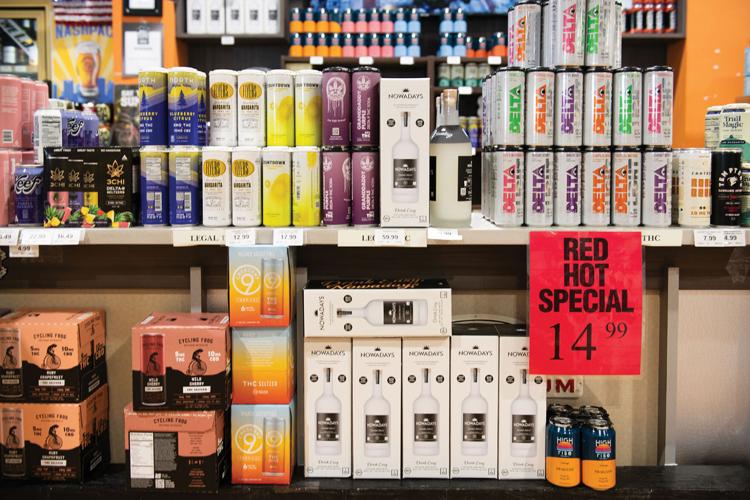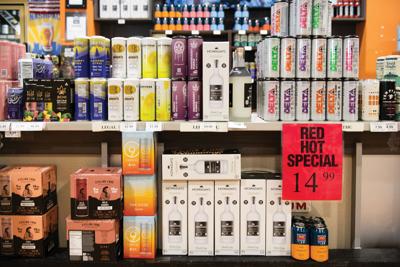When the Craft Brewers Conference came to Nashville in 2018, organizers staged a seminar about future trends and threats for the industry. All anyone wanted to talk about was the advent of hard seltzers, which were booming and taking market share away from craft breweries. But another presentation by Boston Beer founder Jim Koch — whose Sam Adams was a major player in the early craft-beer boom — also drew big crowds as he discussed his intention to expand beyond just beer to combat the flattening market of the time. One of his interests was a novel prospect at the time: cannabis-infused products.
By the time the conference returned to Nashville in 2023, “CBD” and “THC” were the biggest … well, buzzwords among attendees and panel planners. While craft beer and seltzers have seen relatively flat to slightly negative market growth over the past five years, cannabis-infused beverages are growing at a remarkable pace, with Research and Markets projecting an expected growth in the market from $1.2 billion in 2023 to $3.8 billion in 2030.
Anecdotally, local liquor store owners report that CBD- and THC-infused drinks are now outselling entire categories of spirits, and shelves are stocked high with new brands of buzzy beverages arriving monthly. In many cases, craft beer brands are the ones being displaced at retail, including many local breweries that are forced to limit their variety of offerings to protect valuable shelf space.
Cannabis-infused beverages do offer legitimate advantages for some consumers. Lower in calories than beer and generally containing less sugar than flavored seltzers, hemp-derived beverages offer similar effects to those products without the alcohol. But like anything related to the moving target that is the burgeoning cannabis industry, there are a lot of gray areas.

CBD- and THC-infused beverages at a local liquor store
Conflicts between state and federal regulations prevent many small players from attempting to join the game. Issues over how the products should be taxed, how those taxes should be collected and how to even deposit cannabis-derived profits into banks are serious barriers to entry for most breweries considering adding these beverages to their product lines. This is a shame, because a regional brewery should be the ideal spot to manufacture these products, thanks to the ready availability of packaging equipment, tanks for infusing and carbonating beverages, experience with maintaining sanitation and a track record of paying the appropriate taxes on their outputs.
In reality, very few cannabis-infused beverages can truly be called “local.” Most are manufactured by fewer than two dozen huge facilities, many of which are Canadian-owned — Canadian regulations are often clearer and more business-friendly for cannabis corporations.
Both the beer and spirits industries are concerned about what they perceive is a slanted playing field for the upstart companies. Charity Toombs is the executive director of the Tennessee Distillers Guild, a group whose hands are tied by federal regulations prohibiting the combining of intoxicants. “[Our members] would love to have the ability to make spirit-based THC/CBD drinks,” she says, “however, current federal regulations prevent us from getting formulas approved to allow these to be available to the general public.”
“Tennessee is keeping a pulse on the growing trend of THC/CBD drinks and sees this as an opportunity for our members and partners,” says Toombs. “We would welcome the opportunity to meet the increasing interest and demand while diversifying our spirit offerings, especially since younger generations are consuming less alcohol. However, current federal regulations prevent us from doing so at this time.”
Nashville has grown as a craft beer market, and is important enough to bring the Craft Brewers Conference — the premiere national industry conference — to town twice in the past decade. And that’s in large part thanks to the community’s strong support of local breweries. Carl Meier is one of the founders of Black Abbey Brewing Company, a local business that has experienced steady growth over the past 15 years. He has some definite concerns about the future.
“I think that cannabis-based products certainly pose a challenge for all alcohol producers,” says Meier. “If you cite the rise of malt-based seltzers and ‘ready to drink’ cocktails, the data shows that new entrants to the market take share away from the existing players. The seltzer and RTD brands most certainly took, and continue to take, market share from beer and spirits.”
Meier cites another important factor that has been around for years. “The tax burden on ‘intoxicants’ is significantly tilted towards beer first and also wine and spirits in Tennessee,” he says. “This creates an uneven playing field. The ‘on the shelf’ cost of THC beverages can be significantly lower due to the extraordinary tax burden that other producers carry in Tennessee. Tennessee imposes the highest beer wholesale tax in the United States. It will be very difficult, specifically for beer producers, to compete with THC-based beverages as they enter the market — due to the massive tax burden that our industry carries.”
If you love enjoying a pint with friends in a convivial neighborhood taproom, you might want to heed Meier’s final warning about the existential threat to smaller regional breweries: “I am not sure the same ‘support local’ mantra will apply in this category.”
Plus we explore how cannabis-infused beverages are impacting local breweries and go bar-hopping by vibes








